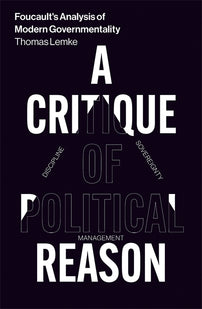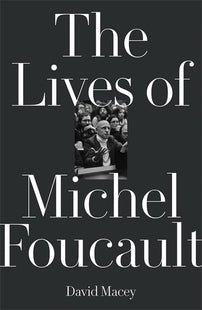Foucault and Neoliberalism as "Left Governmentality"
Mitchell Dean and Daniel Zamora outline Michel Foucault's growing interest in neoliberalism as a "left governmentality" that could act as an alternative to Marxism.

An excerpt from The Last Man Takes LSD by Mitchell Dean and Daniel Zamora, one of our May book club picks. Get your copy by joining the book club for 50% off!
Neoliberalism beyond Right and Left
In this context of hostility towards the post-war Left, Foucault and many others set out in search of what could be called a ‘left governmentality’. As he consistently stated, in his view the French Left did not have a ‘problematic of government’ but only ‘a problematic of the State’. This idea was explicit in his lectures on The Birth of Biopolitics given at the Collège de France, where he famously argued that there was no ‘autonomous socialist governmentality’ and that, therefore, ‘in actual fact, and history has shown this, socialism may only be implemented, connected up to diverse types of governmentality’. A socialist governmentality was thus, for Foucault, still to be ‘invented’.
Neoliberalism with a Franco-German prism
From this perspective, it is interesting to note how much Foucault’s lectures on biopolitics were marked by what Audier called the French ‘crisis of socialism’. If we are used to reading these lectures as being about neoliberalism in general, they are nonetheless also strongly related to the French politics of the time. Foucault’s focus is partially on Valéry Giscard d’Estaing and Raymond Barre’s neoliberal policies and on Germany – especially Helmut Schmidt’s SPD (Social Democratic Party). This choice may seem a strange one for anyone interested in the rise of neoliberal governmentality in the late 1970s. Why, for instance, is there no reference to Pinochet’s coup against Allende in Chile and the neoliberal experiment that followed? Or to Ronald Reagan’s hyper-conservative governorship of California between 1967 and 1975? Why was Foucault only interested in a very abstract reading of neoliberalism, with no regard for its potentially very conservative effects, already manifest in Barry Goldwater’s extremely conservative 1964 US presidential campaign, conducted under Milton Friedman’s economic counsel, and in Reagan’s presidential bid in 1976? He does not even mention Friedrich Hayek’s aristocratic conception of democracy, or the often reactionary opinions of Austrian neoliberals.
One of the reasons for this standpoint is elucidated by Audier, who highlights Foucault’s interest in the very good relations – ‘unique’ as Giscard said himself – between Giscard’s neoliberal government and the Social Democratic government of Schmidt, and what this meant for the future of socialism. As Audier suggests, ‘if Foucault assumes a very German-centred point of view, it’s because he is questioning the destiny of France and of French socialism in 1979: if the “neoliberal” policy of Barre and Giscard seems to partially imitate the social democratic policy of Schmidt, what does socialism mean today?’ This interrogation would divide at the same time both the Left and the Right. As the French economist Christian Stoffaës wrote at the time, ‘the debate on the German model is the moment of original divisions within the political class: Gaullists and Communists communicate in their grumbling; liberal Giscardians, Rocardian socialists and cédétistes [members of the CFDT union] communicate in a barely veiled admiration’. This division would be even stronger in light of the marked lack of enthusiasm among German and UK social democrats for the Common Programme. Giscard would even explain that the day after the 1978 election, the first to rejoice openly at his victory were the social democratic leaders Helmut Schmidt and James Callaghan. From this perspective, Foucault’s lectures on biopolitics are deeply concerned with the crisis facing the Union of the Left at that moment, and with the rise of the neoliberal Right behind Giscard, which in many ways broke with the old Gaullist power. As Foucault himself explained in his lectures, we ‘pass from a, broadly speaking, Keynesian type of system, which had more or less lingered on in Gaullist policy, to a new art of government, which would be taken up by Giscard’. The French context manifests, then, a neoliberalism surging from different sides and with different actors, transcending the old Left–Right opposition to reshape the whole political framework.
In this context, Foucault – along with some of his contemporaries – saw neoliberalism as an interesting framework within which to rethink the Left as a ‘governmentality’ rather than a ‘simple economic logic’. As Lagasnerie argues, Foucault did not see it as ‘something that would function as a political alternative to which a well-defined programme or plan could be attached’. The important point here is that Foucault did not really study neoliberalism as a problem of the ‘Left’ or the ‘Right’. Instead, he was interested in it as a form of governmentality, or what we could call its political ontology, the framework within which it conceived politics and society. As he put it in his lectures:
Liberalism in America is a whole way of being and thinking. It is a type of relation between the governors and the governed much more than a technique of governors with regard to the governed . . . I think this is why American liberalism currently appears not just, or not so much as a political alternative, but let’s say as a sort of many-sided, ambiguous, global claim with a foothold in both the right and the left. It is also a sort of utopian focus which is always being revived. It is also a method of thought, a grid of economic and sociological analysis.
The emergent neoliberal governmentality would thus be essential for the philosopher’s attempt to find an alternative to ‘social-statism’ and to open a space for the proliferation of minority practices.
This political context sheds new light on Foucault’s reading of neoliberalism. Indeed, since the publication of his lectures in 2004, the majority of authoritative commentators have generally projected onto them their own interpretations of neoliberalism. The enormous contrast between the reception of the published courses and that of the course given at the Collège de France is particularly well illustrated by the first account of it, published in September 1979, in the journal Autrement, the emblematic publication of the Second Left. In this piece, written by the journalist Jules Chancel and the management theorist Pierre-Eric Tixier, Foucault’s lessons are not at all depicted as a denunciation of neoliberalism. Their article, entitled ‘The Desire of Entrepreneurship’, argued that with the explosion of alternative economic models in the aftermath of May ’68 (such as autonomous and local experimentations within the ecological movement, anti-institutional struggles or self-management alternatives), ‘the notion of enterprise’ was ‘at the centre of this cocktail of ideologies’. In that context, the authors remarked, Giscard’s government and his neoliberal reforms were surprisingly ‘favourable’ to the proliferation of small, autonomous ‘entrepreneurial’ experiments. Using Foucault’s lectures on neoliberalism, Chancel and Tixier argued that these ‘new entrepreneurs’ of the Left could, within the neoliberal framework, ‘use the convergences, objective but partial, which exist between their experiences and the governmental perspectives, without falling into the trap, so convenient, of “co-optation” ’. In their view, what Foucault helped us to understand was that a subversive use of neoliberalism was possible, that in its ‘enterprise-oriented’ framework the Left could open spaces for its own anti-‘social-statist’ politics, to create a ‘third sector’ of ‘creative entrepreneurs’ in between the state and the more traditional firms. As Audier observed, ‘this first and almost immediate mobilization of Foucault’s lectures on neoliberalism . . . is undoubtedly a valuable document because it reveals elements of context that are no longer those of readers of the twenty-first century or even of the nineties, and are generally ignored by them, as if Foucault had written only for them and in their own context’.
The Autrement journal intended then to ‘rehabilitate’ the concept of ‘enterprise’ within the Left by titling its special issue ‘What If Everyone Created His Own Job?’ It included articles by Jacques Delors, future president of the European Commission, criticizing the ‘invasion of the person by institutions’, and by Michel Rocard – Foucault’s favourite socialist – arguing that the ‘freedom’ to be an entrepreneur should be an integral part of the struggle against totalitarianism. Interestingly, this key publication of the French Second Left also included an interview with Bernard Stasi, a former right-wing minister in Giscard’s government. Stasi illustrated perfectly what Foucault had sensed about neoliberalism:
the state, whatever its political connotation, necessarily tends to tighten its control, its tutelage, on society. It is necessary, by building all kinds of safeguards, to ensure that society is not crushed by the State, that there is a certain autonomy, spaces of freedom for individuals and natural communities. It is only through the diversification of funding sources that it will be possible to avoid the increase in state control.
Finally, in the same issue, it is worth noting the paper by the sociologists Bernard Rochette and Elie Théofilakis, who argued openly that ‘the remedy is simple if a little retro: reinventing the market’.66 In their view, in the aftermath of ’68 and the energy it released, it was obvious that ‘the market is no longer only the static equilibrium between a supply and a demand for goods, but the global dynamic process of integration and articulation of all the effervescent elements of a new social order’. Indeed, while the old welfare state affected negatively both economic growth and social justice, the market, if carefully reorganized, could have a ‘therapeutic value’ in regulating social exchanges. Behind this shift, what was now emerging, on both the Right and the Left, was ‘the figure, for a time overshadowed by the planning technocrat, of the entrepreneur’. In this new context, the neoliberal economist, the ‘manager’ and the ‘leftist entrepreneur’ could all rejoice together within the spaces freed from statist normativity.
In many ways, this Second Left felt that it sometimes shared more with the Giscardian and neoliberal Right than with the ‘social-statism’ of its own party. A new field of experimentation was thus opened by this ‘new capitalism’, creating the conditions for new coalitions between past enemies. If this context is important, it is precisely because it gives us a sense of what kind of neoliberalism Foucault was talking about in his lectures, and of the conversation of which they were a part.




